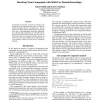Free Online Productivity Tools
i2Speak
i2Symbol
i2OCR
iTex2Img
iWeb2Print
iWeb2Shot
i2Type
iPdf2Split
iPdf2Merge
i2Bopomofo
i2Arabic
i2Style
i2Image
i2PDF
iLatex2Rtf
Sci2ools
114
click to vote
FLAIRS
2006
2006
Resolving Noun Compounds with Multi-Use Domain Knowledge
In this paper we describe a system for semantic interpretation of noun compounds that relies on world and domain knowledge from a knowledge base. This architecture combines domain-independent compounding rules with a task-independent knowledge representation, allowing both components to be flexibly reused. We present examples from Scientific American text, on which the system was developed, and then describe an exercise that tests the portability of the architecture to a new domain: email text on the topic of conference planning.
Artificial Intelligence | Domain Knowledge | Domain-independent Compounding Rules | FLAIRS 2006 | Task-independent Knowledge Representation |
| Added | 31 Oct 2010 |
| Updated | 31 Oct 2010 |
| Type | Conference |
| Year | 2006 |
| Where | FLAIRS |
| Authors | Alicia Tribble, Scott E. Fahlman |
Comments (0)

